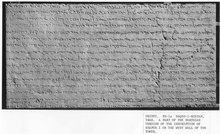Inscriptional Parthian
| Inscriptional Parthian | |
|---|---|
 Parthian version of Shapur I's inscription at the Ka'ba-ye Zartosht | |
| Script type | |
Time period | c. 100 CE – c. 400 CE[1] |
| Direction | Right-to-left script |
| Languages | Parthian language |
| Related scripts | |
Parent systems | Aramaic alphabet
|
| ISO 15924 | |
| ISO 15924 | Prti (130), Inscriptional Parthian |
| Unicode | |
Unicode alias | Inscriptional Parthian |
| U+10B40–U+10B5F | |
Inscriptional Parthian was a script used to write the Parthian language, the majority of the text found were from clay fragments. This script was used from the 2nd century CE to the 5th century CE or in the Parthian Empire to the early Sasanian Empire. During the Sasanian Empire it was mostly used for official texts.[2][3][citation needed]
Inscriptional Parthian is written right to left and the letters are not joined.[citation needed]

Letters
[edit]Inscriptional Parthian uses 22 letters:[3]
| Name[A] | Image | Text | IPA[4] |
|---|---|---|---|
| Aleph | 𐭀 | /a/, /aː/ | |
| Beth | 𐭁 | /b/, /v/ | |
| Gimel | 𐭂 | /g/, /j/ | |
| Daleth | 𐭃 | /d/, /j/ | |
| He | 𐭄 | /h/ | |
| Waw | 𐭅 | /v/, /r/ | |
| Zayin | 𐭆 | /z/ | |
| Heth | 𐭇 | /h/, /x/ | |
| Teth | 𐭈 | /t/ | |
| Yodh | 𐭉 | /j/, /ĕː/, /ĭː/ | |
| Kaph | 𐭊 | /k/ | |
| Lamedh | 𐭋 | /l/ | |
| Mem | 𐭌 | /m/ | |
| Nun | 𐭍 | /n/ | |
| Samekh | 𐭎 | /s/ | |
| Ayin | 𐭏 | /ʔ/ | |
| Pe | 𐭐 | /p/, /b/ | |
| Sadhe | 𐭑 | /s/ | |
| Qoph | 𐭒 | /q/ | |
| Resh | 𐭓 | /r/ | |
| Shin | 𐭔 | /ʃ/, /ʒ/ | |
| Taw | 𐭕 | /t/, /d/ |
Ligatures
[edit]Inscriptional Parthian uses seven standard ligatures:[3]
| Ligature | Sequence | |
|---|---|---|
| Image | Text | |
| 𐭂𐭅 | 𐭂 (gimel) + 𐭅 (waw) | |
| 𐭇𐭅 | 𐭇 (heth) + 𐭅 (waw) | |
| 𐭉𐭅 | 𐭉 (yodh) + 𐭅 (waw) | |
| 𐭍𐭅 | 𐭍 (nun) + 𐭅 (waw) | |
| 𐭏𐭋 | 𐭏 (ayin) + 𐭋 (lamedh) | |
| 𐭓𐭅 | 𐭓 (resh) + 𐭅 (waw) | |
| 𐭕𐭅 | 𐭕 (taw) + 𐭅 (waw) | |
The letters sadhe (𐭑) and nun (𐭍) have swash tails which typically trail under the following letter.[3]
| Ligature | Sequence | |
|---|---|---|
| Image | Text | |
| 𐭍𐭍 | 𐭍 (nun) + 𐭍 (nun) | |
| 𐭍𐭃 | 𐭍 (nun) + 𐭃 (daleth) | |
Numerals
[edit]Inscriptional Parthian uses its own numerals:
| Value | 1 | 2 | 3 | 4 | 10 | 20 | 100 | 1000 | |
|---|---|---|---|---|---|---|---|---|---|
| Sign | Image | ||||||||
| Text | 𐭘 | 𐭙 | 𐭚 | 𐭛 | 𐭜 | 𐭝 | 𐭞 | 𐭟 | |
Numbers are written right-to-left. Numbers without corresponding numerals are additive. For example, 158 is written as 𐭞𐭝𐭝𐭜𐭛𐭛 (100 + 20 + 20 + 10 + 4 + 4).[3]
Unicode
[edit]Inscriptional Parthian script was added to the Unicode Standard in October, 2009 with the release of version 5.2.
The Unicode block for Inscriptional Parthian is U+10B40–U+10B5F:
| Inscriptional Parthian[1][2] Official Unicode Consortium code chart (PDF) | ||||||||||||||||
| 0 | 1 | 2 | 3 | 4 | 5 | 6 | 7 | 8 | 9 | A | B | C | D | E | F | |
| U+10B4x | 𐭀 | 𐭁 | 𐭂 | 𐭃 | 𐭄 | 𐭅 | 𐭆 | 𐭇 | 𐭈 | 𐭉 | 𐭊 | 𐭋 | 𐭌 | 𐭍 | 𐭎 | 𐭏 |
| U+10B5x | 𐭐 | 𐭑 | 𐭒 | 𐭓 | 𐭔 | 𐭕 | 𐭘 | 𐭙 | 𐭚 | 𐭛 | 𐭜 | 𐭝 | 𐭞 | 𐭟 | ||
| Notes | ||||||||||||||||
References
[edit]- ^ https://escholarship.org/uc/item/2hm6b38h
- ^ "Proposal for encoding the Inscriptional Parthian, Inscriptional Pahlavi, and Psalter Pahlavi scripts in the SMP of the UCS". escholarship.org. Retrieved 2024-09-18.
- ^ a b c d e f Everson, Michael; Pournader, Roozbeh (2007-08-24). "L2/07-207R: Proposal for encoding the Inscriptional Parthian, Inscriptional Pahlavi, and Psalter Pahlavi scripts in the SMP of the UCS" (PDF).
- ^ Daniels, Peter T.; Bright, William, eds. (1996). The World's Writing Systems. Oxford University Press, Inc. pp. 518. ISBN 978-0195079937.
